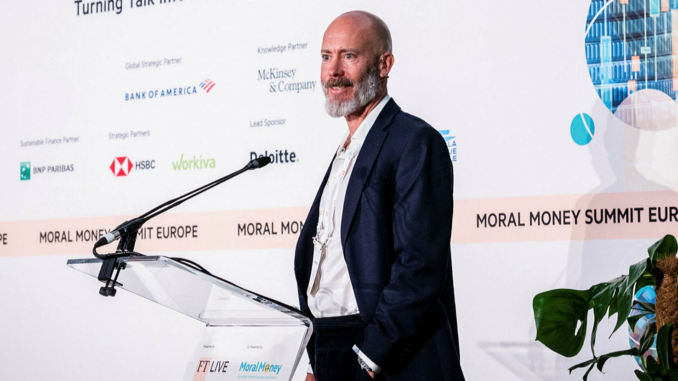
Essay by Eric Worrall
Did Stuart Kirk’s presentation strip away a legal defence of feigned ignorance from financial advisors who sell dubious green investments?
Imagine if hypothetically in the early days of the frenzy which led to the GFC / Subprime Mortgage Crash, a senior banker had very publicly announced everyone who invests in Subprime mortgages would eventually lose their money, had explained in detail what the problem was, and had concluded that based on their carefully reasoned argument the investments had no genuine value. Then in 2008, when all the spinning plates crashed, everyone who purchased subprime mortgage products could have sued to get their money back. Bankers who sold subprime would have been open to accusations from lawyered up clients that they committed fraud, that they knew some of their clients would lose money, before they sold those high risk subprime financial products.
Stuart Kirk’s broadside attack on the green investment industry may have done just this to the green investment industry. His attack may have stripped financial advisers who sell dubious green investments of their legal cover.
Why HSBC’s response to Kirk’s climate speech was damaging to responsible investment
In a bid to manage the PR fallout from the explosive presentation on climate change by head of responsible investment Stuart Kirk, HSBC’s blunt response may have done more damage to public discourse than his comments themselves.
By Daniel Flatt
May 26, 2022 updated 27 May 2022 9:56am
- After Stuart Kirk, HSBC Global Asset Management’s head of responsible investment, argued that climate risk was overplayed, his comments were swiftly disavowed by HSBC’s top executives and he was suspended.
- Many are sceptical about the assertions by HSBC group CEO Noel Quinn and others in the leadership team about the group’s view on climate risk and its commitment to achieving net zero.
- Several institutional investor groupings preferred not to comment to Capital Monitor on the situation, but Kirk had raised several important points worthy of further debate.
What a difference a 16-minute presentation on climate change makes. The now-infamous speech by Stuart Kirk, head of responsible investment at HSBC Global Asset Management, last week on why investors have more things to worry about today than they do in 20 years’ time might well be remembered for a similarly long period.
What is less likely to stick in the memory is the financial group’s response. It should do, though, because it was an equally brazen act of self-defence that will have wider ramifications for how financial institutions tackle public discourse on climate change.
Without raking over the finer details – as has been done expansively already – we will underline one thing: Kirk made it abundantly clear he believes climate change is real, but it is not a financial risk worth worrying about.
The resultant public outcry was huge. Many investors and climate experts – and others besides – voiced their horror on social media at what they felt was an ill-conceived point of view. What’s more, existing and prospective clients of the firm are seen as likely to increase their due diligence of asset managers’ climate strategies as a result.
If you haven’t watched Stuart Kirk’s presentation, I strongly urge you to do so – it might not be there forever
If Stuart Kirk’s devastating accusations are correct, in my opinion his words could be interpreted as suggesting the inputs to financial models which predict a demand for the climate investment products currently being sold are being heavily manipulated to produce a preconceived outcome. Stuart appeared to claim he is being “pressured” to add unrealistic assumptions to climate financial models, to “move the needle” on predicted economic harm from climate change.
If there turns out to be no genuine need for green climate investments, and that fact was hidden because as Stuart seemed to suggest, bank financial models are being heavily manipulated to create a fake impression of need – Stuart has effectively let the cat out of the bag.
Stuart’s presentation means there is public domain evidence of problems. Financial advisors can no longer claim they were as surprised as everyone else, if the value of the green investment products they are selling collapses.
Anyone who loses money on green investments potentially has a strong case, if they try to sue their financial adviser to get their money back. All they need to do is point to Stuart’s presentation, and argue that anyone with expert knowledge of the climate investment industry should have been aware there were problems, at the time the investment products were sold. At the very least Stuart’s presentation is prompting “increased due diligence” – more detailed oversight of the assumptions which are being fed into the future value projections of climate investments.
Note I’m not an investment advisor or a lawyer, so please don’t quote me on your lawsuit – but I think there is a real possibility that when people look back on the history of green investments, Stuart Kirk may quietly be recognised as the hero who saved us from the worst of the coming green GFC, the banker who put the pebble on the rails of train green before it reached its full potential as a global economy wrecking investment bubble.
Stuart, you’re my hero mate.
Source: Wattsupwiththat.com



